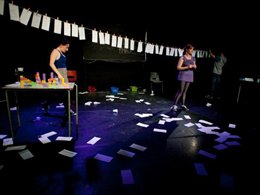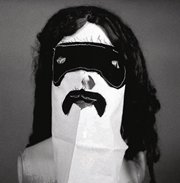Now in its fourth year, Galway Theatre Festival took place from 25 - 31 October, 2011 and was the biggest yet, running across Nuns Island Theatre and Town Hall Theatre (Studio), along with non-traditional spaces. ITM critics attended some of the productions on offer - read what they thought below.
All Things Considered It’s a Nice Place to Start
Kate Nic Chonaonaigh and Louise White
Town Hall Theatre Studio
Reviewed 28 October, 2011
Snail-mail may be moribund but not if you’re several characters in search of a play. All Things Considered It’s a Nice Place to Start is based on the archaic practice of exchanging letters and the resultant theatre is frothy, pastel-coloured Irish propaganda.
 The devisers posted three hundred handwritten letters to deserving people throughout Ireland: school principals one day, social housing inhabitants or relatives the next, and so on. Each letter thanked the recipient for being a good-sort and soldiering on. The senders awaited replies. Their ‘random-act-of-kindness’ and any response would be the subject of their play.
The devisers posted three hundred handwritten letters to deserving people throughout Ireland: school principals one day, social housing inhabitants or relatives the next, and so on. Each letter thanked the recipient for being a good-sort and soldiering on. The senders awaited replies. Their ‘random-act-of-kindness’ and any response would be the subject of their play.
With dance, mime, punning, ingenious use of washing lines and even a bit of a bounce on some mini-trampolines, the work is marked by appositely directed theatrical devices. It’s well-judged, tongue-in-cheek joviality that bigs-up the Irish everyman and it is delivered slickly by very experienced performers. Making this thoroughly modern too, the ‘fourth-wall’ is undermined with asides, appeals, nudges and explanations to the audience who become willing participants in this troupe’s enviable zest for life.
Whilst All Things Considered… is warm, optimistic and spits (politely) in the face of doom and gloom, the elephant in the room was that the group did not seem to get many answers to their missives. There is scarcely a nod towards this event, and the overall impression is of an exploration of theatre’s medium rather than its message.
Matthew Harrison is an English Teacher at Coláiste Iognáid, Galway and a regular contributor to arts programmes on RTÉ.
Almost a Fantasy
Mephisto Theatre
Nuns Island Theatre
Reviewed 27 October, 2011
Award-winning poet Caroline Lynch teases black comedy out of the ambiguous and the contradictory in her new play Almost a Fantasy. Lynch’s clever dialogue is rich, multi-layered and full of playful puns. A character refers to “well-bred repressions and complex complexes” - Mephisto’s ludicrous on-stage scenarios, under O’Grady’s vibrant direction, sought to unravel such unconscious desires.
 Lynch and O’Grady’s set, as well as Miriam Donohue’s costumes, helped to create an opulent, naturalist milieu which was productively at odds with the play’s absurd content. The three characters transcend the mundane through fantasy and confusion. Donna, an amnesiac bride (Lynch), George, her husband (Maguire), and The Chambermaid (Gregg) sensuously gorge themselves on fruit and champagne. As the trio ebbed further into an imaginary realm, these appetising props were imbued with comic innuendo – especially the bananas. The actors switched and rearranged costumes to intensify the mutability of the drama’s roles.
Lynch and O’Grady’s set, as well as Miriam Donohue’s costumes, helped to create an opulent, naturalist milieu which was productively at odds with the play’s absurd content. The three characters transcend the mundane through fantasy and confusion. Donna, an amnesiac bride (Lynch), George, her husband (Maguire), and The Chambermaid (Gregg) sensuously gorge themselves on fruit and champagne. As the trio ebbed further into an imaginary realm, these appetising props were imbued with comic innuendo – especially the bananas. The actors switched and rearranged costumes to intensify the mutability of the drama’s roles.
There was palpable chemistry between Lynch, Maguire and Gregg, which contributed to a smoothly-nuanced production. Maguire was particularly entertaining, harnessing the comedy of George’s aloof eccentricity with hilarious facial expressions. Through effervescent performance, Mephisto successfully drew the viewers into the cyclical, elusive world of Almost a Fantasy. The show offered the receptive, lunch-time audience which filled Nuns Island Theatre a brief but exhilarating escape from the quotidian.
Siobhán O’Gorman is currently completing a doctoral research project on contemporary theatre at the National University of Ireland, Galway.
Before The Devil Knows You’re Dead
TrueWest Theatre
Áras na nGael
Reviewed 30 October, 2011
The investigative reporter and the perpetual chase of the ‘story’ has been the central block of much crime drama. Truewest Theatre manage to bring the archetype into bizarre, new territory.
 Conor McDonagh is frustrated with wasting his journalistic abilities on coverage of agricultural fairs and supermarket offers. Luckily, he lands the case of the suspicious death of a well-known businessman, an investigation which leads him to unearth a dark family history.
Conor McDonagh is frustrated with wasting his journalistic abilities on coverage of agricultural fairs and supermarket offers. Luckily, he lands the case of the suspicious death of a well-known businessman, an investigation which leads him to unearth a dark family history.
Director Rae Visser uses wolf-masked guides to bring us through the winding shape of the Áras na nGael. We’re lead from the wisecrack draw of a newspaper office to a shifty alley outside. A jeep abruptly blaring to life, catching the cornered audience in its intimidating headlights as it approaches, is among Visser's most unpredictable and spooky employments.
It’s hard to tell, though, whether the writing is aiming to be sassy noir or a satire of the genre, featuring lines such as “You have to let the story find you!” Where it’s teething melodrama, it harms Jerry Fitzgerald’s otherwise strong performance, his protagonist pushed into ‘action hero’ territory. The play transitions from a natural chapter into a supernatural one, completely strange and wild with a twist in the tale.
In TrueWest’s play the reporter and the ‘story’ become one. The tale clunks with heavy exposition and is sometimes confusing, but was festively appropriate for the witching season that was in it.
Christopher McCormack writes on Irish theatre at Yay.ie and his own blog Musings in Intermissions.blogspot.com
Gun Metal Grey
Truman Town Theatre
Town Hall Theatre Studio
Reviewed 25 October, 2011
A new playwright doesn’t have to kow-tow to audience expectation. Bare-knuckle writer Mick Donnellan bars no holds in Gun Metal Grey, his lively and belligerent homage to John B Keane and Martin McDonagh for the 2011 Galway Theatre Festival.
 Bogged downby our recession, reduced to swindling pints off their put-upon publican, two young unemployed drinkers discuss their unprepossessing prospects. Emigration? To leave, or not to leave: that is the question. The ubiquitous country bar complete with juvenile bride mis-matched to octogenarian farmer, colourful culchies, and general blackguardery, could be in Listowel or thereabouts. But John B exits when the expletives flow, the loss-adjuster arrives and Donnellan allows a roguish black humour loose in his eccentrically extravagant, half-cracked finale.
Bogged downby our recession, reduced to swindling pints off their put-upon publican, two young unemployed drinkers discuss their unprepossessing prospects. Emigration? To leave, or not to leave: that is the question. The ubiquitous country bar complete with juvenile bride mis-matched to octogenarian farmer, colourful culchies, and general blackguardery, could be in Listowel or thereabouts. But John B exits when the expletives flow, the loss-adjuster arrives and Donnellan allows a roguish black humour loose in his eccentrically extravagant, half-cracked finale.
Despite the fact that the copious expletives feel a little extemporised, there are signs of a careful writer here. Donnellan spares the pathos, goes large with sit-com and is generous with striking language – particularly with his several lyrically acerbic diatribes on emigration. Director Theresa Leahy teases enjoyable performances from her eclectic cast and does this without letting up on the pace that the work’s more farcical elements require. This is fairly remarkable on the first night of a two-performance run.
When the occasionally erratic acting and the rickety set are forgiven, what is most memorable is the writing: Gun Metal Grey is a precise distillate of 2011’s woes. It is sharp but not bitter, and although it may be yet another ‘recession realism’ work, its anarchic desperation is perversely colourful.
Matthew Harrison
Murder On Main Street
The Gonzo Theatre
Crane Bar
Reviewed 29 October, 2011
 Getting the attention of the man behind the counter at the Crane Bar was a frustrating effort, and as the clock ticked towards show-time I had no choice but to give up. With glee then, I met the two crooks of Philip Doherty’s play, Murder on Main Street, who claimed they had “taken out” the barkeep of the joint.
Getting the attention of the man behind the counter at the Crane Bar was a frustrating effort, and as the clock ticked towards show-time I had no choice but to give up. With glee then, I met the two crooks of Philip Doherty’s play, Murder on Main Street, who claimed they had “taken out” the barkeep of the joint.
Left with the problem of removing the barman’s head, one leaves to conduct the gruelling task while the other is snuck up on by a loyal cantankerous customer, entering from his own “special door”, full of questions. What follows is a hilarious interrogation, with a detour through a recreation of the story of St. Patrick, and an exploitation of sacrilegious mistakes such as pouring stout in a lager glass or ruining a head of Guinness.
Director Damien O’Brien makes good use of the space, using high energy performances from Kieron Smith and Shane Carroll to slam doors and send barstools crashing. Doherty’s writing belches, swaggers, and, thankfully, also has an undeniable malt of wit, best demonstrated here through Peadar Lafferty’s sarcastic delivery. The play is chiefly a vehicle for the writer’s punch-lines though: it would be interesting to see how else Doherty could write for the stage.
Christopher McCormack